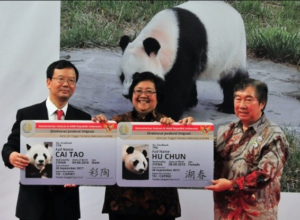Malaysia’s Minister of Plantation and Commodities, Johari Abdul Ghani said that they plan to start an “Orangutan Diplomacy” for countries that buy palm oil. Mr Ghani said that this would improve foreign relations, especially in major palm oil importing countries such as the European Union, India and China.
Mr Ghani announced this plan in the 2024 biodiversity forum, where the Malaysian Palm Oil Green Conservation Foundation (MPOGCF) collaborated with the Department of Wildlife Protection and National Parks of Peninsular Malaysia (Perhilitan) and Universiti Pendidikan Sultan Idris (UPSI).
📍MALAYSIA BERHASRAT PERKENAL “DIPLOMASI ORANG UTAN” KEPADA NEGARA DAGANG SAWIT
Merasmikan Forum Biodiversiti Yayasan Pemuliharaan Hijau Minyak Sawit Malaysia (MPOGCF) di Resorts World Awana. pic.twitter.com/hNXTTcZEq5
— Johari Abdul Ghani (@joharighani) May 7, 2024
Malaysia’s ‘Orangutan Diplomacy’
Malaysia is the world’s second-largest producer of edible oil after Indonesia. Together they control 85 per cent of the market. This mass development of industries in Malaysia has raised questions about environmental protection. Many people raised questions about the protection of critically endangered Orangutans and destruction of their biodiversity.

The European Union has decided to do something about it with a ‘deforestation-free’ regulation. Thus no natural product like palm oil shall be imported by the EU if obtained by deforestation.
The International Union for Conservation of Nature’s Red List estimates the orangutan population on Borneo, which is shared between Brunei, Indonesia and Malaysia, will decline to about 47,000 by 2025 as a result of human pressures and loss of habitat. It estimates there are about 13,500 orangutans left in Sumatra.
Mr Ghani said that the ‘Orangutan diplomacy’ programme was inspired by China’s panda diplomacy. This would increase trade and also provide the endangered animals with a safe environment.
“By introducing ‘orangutan diplomacy’, it directly proves to the world community that Malaysia is always committed to biodiversity conservation.”, said Mr Ghani.
He further said, “Malaysia cannot take a defensive approach to the issue of palm oil, instead we need to show the countries of the world that Malaysia is a sustainable oil palm producer and is committed to protecting forests and environmental sustainability.”
How will this work?
The Minister informed that according to this diplomacy, animals will be offered as trading gifts in an effort to allay concerns about the environmental effects of growing the commodity.
He welcomed large oil palm companies to collaborate with non-governmental organisations (NGOs) to care for, preserve and raise awareness for our global partners while also providing technical expertise on iconic wildlife species in Malaysia.
“This will be a manifestation of how Malaysia conserves wildlife species and maintains the sustainability of our forests especially in the oil palm plantation landscape.”, said Johari Abdul Ghani.
No further details were provided regarding the programme.
Another panda diplomacy?
China’s panda diplomacy was used to increase China’s soft power in other countries. They would lease Pandas to zoos and museums and the process was strictly controlled by China. Any offspring of the Pandas had to be sent back to China.

Malaysia’s Orangutan diplomacy is a little different. It is brought in with the aim of protecting Orangutans from extinction. They would give it to their trading partners specifically the EU, India and China.
Thus, Malaysia’s diplomacy is a sign to show the EU that they care about the environment and protect their Orangutans, hoping that the EU doesn’t stop importing palm oil, blaming them for deforestation.
Malaysia is a developing nation and palm oil industries are very important for their growth. Thus, the EU’s new law will only hurt their growth as palm oil is a major contributor to their growth. Malaysia called the new law “regulatory imperialism” and “crop apartheid.” They have challenged this law at the World Trade Organization but for now this “orangutan Diplomacy” is their tactic.











Comments 1